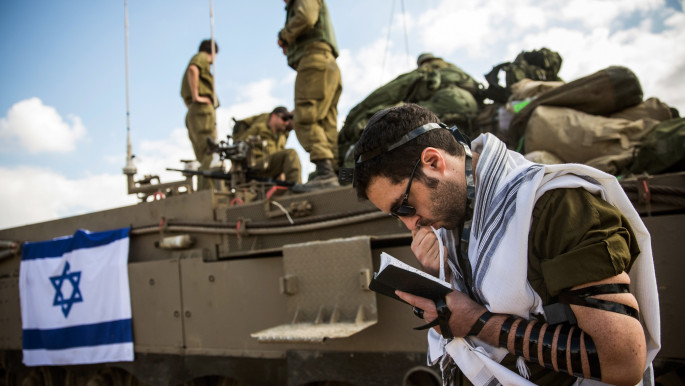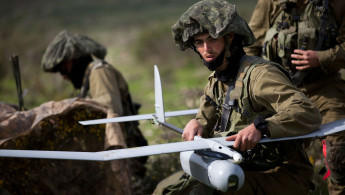The Technion: an elite university for Israeli student-soldiers
Universities are generally considered independent institutions, privileged spaces fostering intellectual exchange and critical free thought.
But they can also be embedded in a military-industrial complex and as such be implicated in reprehensible activities involving their leaders in a war crimes tribunal. This is what happened with the Technion – the Institute of Technology in Israel.
Nothing perhaps makes the Technion's place in Israeli society clearer than a recent article in the August 2014 issue of the university's newsletter by Peretz Lavie, the president of the Haifa-based institute of Technology.
“This summer, Israel is again compelled to defend itself against a barrage of missile attacks aimed at civilian populations," the university choef wrote. "Once again, the Iron Dome defensive anti-missile system saves countless civilian lives. Iron Dome was developed by the excellent engineers at Rafael Advanced Defense Systems, most of whom are Technion graduates.
"In addition, a vast underground network of terror tunnels, many of them directly threatening unarmed Israeli children, women and men, was revealed and had to be neutralized. In this arena also, Technion scientists are helping lead the effort to harness scientific innovation to thwart this threat.”
As the military tone of the piece makes clear, the Technion’s involvement in the war of occupation increasingly blurs the boundary between a civil and a militarised society – and is thus a contributing factor to the diminishing chances of a negotiated peace in the Middle East. The success of the “student-soldier” concept has only served to further exacerbate the double divide in Israeli society: the internal divide between Jews and non-Jews, and the divide between Israel and its geopolitical environment including, of course, occupied Palestine.
The ideals of the Technion no longer have much in common with those of an ordinary institution of higher education. This developing hard line position is clearly reflected in its make-up: The proportion of students and professors at the Technion who are also current and ex-servicemen or reservists is the highest of any Israeli university.
According to Arnie Ludwick and Gary Goldberg, Presidents of Technion Canada (one of the Technion’s international partners), it even has the highest percentage of students serving in the army reserves, belonging both to the academic elite of the Technion, and the military elite of the Israeli army.
$500,000 for soldiers in Gaza
| The university is in many ways acting as the technological spearhead of Israel's nationalist groundswell |
The Technion began as a public university for research. It was founded in 1912 in Haifa during Ottoman rule. Today it has more than 13,000 students. It could have been (and, one might argue, should have been) a place of sanctuary for the universal values of science, functioning as a first-class university and open to all students living in the territory of 1948 Palestine. It has not, however, escaped the groundswell of nationalism that has marked Israeli society in recent decades. In many respects the university is even acting as the technological spearhead of this groundswell.
During Israel's military assault on Gaza in July and August this year, which caused the death of about 2,200 Palestinians, of whom two-thirds were civilians, the Technion raised more than $500,000 from private sources for its more than 600 students who went to war in Gaza.
This commitment to supporting student-soldiers is not a responsibility of the private sector. Even on the most official level, more privileges are being awarded to people who have served in the army. One of the most recent, in 2010, was amendment number 12 to the law on the reintegration of soldiers released from military service, stipulating that as long as they lived in a “national priority zone”, they will benefit from a compensation package.
These “compensatory” measures include a contribution to their university fees, a free preparatory year of study and other advantages like university housing. Some organisations campaigning for the rights of Palestinian citizens of Israel pointed out that, for obvious reasons, these Palestinians did not do military service and were thus disadvantaged, as they were denied this advantage.
From collaboration to participation
But the problem is both more serious and more general: it is the Israeli university itself which, by dint of its participation in the prison-like containment and control of occupied territories and the repeated punitive operations within them, could be guilty of complicity in war crimes before a court of justice. On an ideological level, this university has made an important contribution to the current destructive status quo, perpetuating the myth of a state in danger protected only from the “barrage of missiles” by the ingenuity of the student-soldiers.
The Technion actively collaborates with Elbit Systems, the largest armament and drone manufacturing company in Israel. In 2008, Elbit officially committed to giving grants to research students at the Technion of up to $500,000 per year for five years. Yossi Ackerman, the company’s iconic president from 1996 to 2013, received an Honorary Doctorate from the Technion. Haim Russo, who runs the branch of Elbit specialising in military equipment, was appointed to the university’s Executive Board.
A joint Technion-Elbit laboratory dedicated to artificial vision develops the technologies used by drones for surveillance of the separation wall in occupied Palestinian territory and of the settlements. This is of course a blatant violation of international law.
Similarly, the Technion is linked to the State conglomerate Rafael Advanced Defense Systems Ltd., one of the largest weapons companies in Israel. Like Elbit, it enjoys the same close links with the organisation, the same mobility of individuals from one to the other, and the same influence over the choices the military makes over the focus of the research. Many former Technion students work at Rafael, and an MBA was created specifically by the Technion for managers at Rafael. In addition, in 2013 Rafael directly recruited 150 students from the Technion to direct research into future armaments. They will divide their studies between Rafael and the Technion.
Double-talk
 |
|
| Many students at the Technion are also Israeli army reservists, and some served in this summer's Gaza offensive (Getty). |
The university's questfor military innovation is relentless. A communiqué from the Technion in 2009, which quickly disappeared from the web (but was retrieved from web.archive), four isntance outlined the possibility of remote-controlled bulldozers in an effort to protect Israeli army drivers otherwise at risk when "they demolish buildings in which terrorists are hiding or try to open a road”.
With such close association to a military occupation illegal under international law, the Technion, like all Israeli institutions involved in foreign partnerships, possibly under pressure from the International Boycott, Divestment and Sanctions (BDS) campaign, has become a master in the art of doubletalk. In the prospectus for its international audience, it prides itself on its openness, its green lawns and its relaxed students.
There is even a considerable number (by national standards) of Palestinian students, all also citizens of Israel. It also benefits from external funding, research loans and a testing ground that allows the exportation of Israeli applied knowledge to over 70 countries.
The Technion, its lecturers, researchers and students have become an essential cog in the Israeli war machine, a pillar of hard line Israeli policy. And international calls for an academic boycott are growing.
This article is an edited translation of the original which appeared in OrientXXI.



